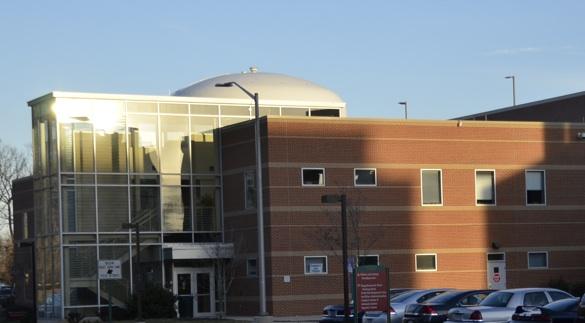Interim police chief announces application to stay on permanently
On Monday, Feb. 11 2013, the time came for Interim Police Chief Drew Tracy to decide whether he was going to apply to stay on as the chief of police.
“Yes,” Tracy answered with characteristic directness. “I talked it over with my wife, I called some of my friends over the years and went over the pluses and minuses. In the end, being able to participate in the academic side played a big role, and today I applied for the job.”
Tracy has served as interim police chief for the Mason Police Department since November 2012 when the previous police chief, Mike Lynch, had changed positions and ultimately stepped down. Now Tracy intends to apply to fill the position permanently.
Tracy worked for 30 years in Montgomery, Md. with a variety of jobs ranging from assistant chief in charge of narcotics and undercover police to chief of detectives, with several years as SWAT leader thrown into the mix. He was also head of a multi-jurisdictional team that dealt with the Beltway Sniper crisis, the hostage standoff at the Discovery Channel building and the investigation of the murder of Janya Murray in a Lululemon Yoga Store, a case he simply described as “bizarre.”
Tracy has a Bachelor of Arts degree from Hood College in Frederick, Md. and is accredited as a Certified Public Manager from George Washington University. He is also a graduate of the FBI National Academy and of the DEA’s Drug Unit Commanders Academy.
“Since then I’ve been sub-contracting for the State Department,” Tracy said. He specifically worked in anti-terrorism assistance, particularly in Africa, the Middle East, South Asia, Mexico and South America.
While Tracy has never policed at a university level before, the Mason police department has been more active and undergone more radical changes in his few months as chief than it had in the past few years.
Tracy said there are some significant similarities and differences between his time in Maryland and what he’s learned so far at Mason:
“The diversity of the people here is very similar, which is important to understand and deal with. The clientele here is very different though, here it’s mostly 18-20. We look more towards the safety of those individuals. We are very interested in communicating and visibility. We want to be more visible to students and talk to people.”
The topic of being more involved with students comes up frequently.
“Two of the days when I first came here I was on a bike and I didn’t tell anyone who I was,” Tracy said. “That’s actually how I met Alex Williams, the student body president. Once you talk to people, you make it a personal communication. I call it money in the bank.”
It is the communication between Tracy and Williams that led to the chief introducing himself to the Mason student government and giving a presentation on his vision for the future of Mason Police Department.
“What brought you back [to Mason]?” asked Senator Morgan Paugh during the chief’s presentation.
“Things like Virginia Tech,” Tracy explained, “they scare the hell out of me, and if I can do something to help prevent it I want to be a part of that.”
His concern was reflected in the recent crisis training where Mason police worked with local police departments and local fire and rescue squads to practice procedure for an active shooter situation on campus and to clarify the command structure.
“It’s all about partnerships,” Tracy said. “Not just inside the community; that extends to local law enforcement and fire rescue and to the people here.”
Tracy’s plan for Mason also involved reassessing the leadership within the police department.
“I had to restructure some executive management,” Tracy explained. When asked whether that caused internal strife, he shook his head.
“It’s all about respect here, and I’m grateful to have it. A lot of younger people here are well trained,” Tracy chuckled. “I yell a lot.”
Tracy hopes to find a balance between leniency and security that he hopes can satisfy all involved parties.
“We have to be extremely strong on the security aspect, and we’re focusing on that,” Tracy said. “We also have to be strict on crime with victims. That means drunk driving. That means selling drugs. That means sexual violence and theft.”
At the same time, Tracy acknowledges that a university cannot be policed exclusively with an iron fist.
“Everybody makes a mistake and everyone gets a second chance. I’ve been telling my officers, for a first offense, always defer to the university. Stay away from the criminal aspect. Say you’re 19 and you have a joint, you’re arrested and now that’s on your record; so I want that deferred,” Tracy explained. “That’s my philosophy and I think it’s working.”
Tracy also expressed interest in the academic affairs of Mason. One of his incentives for coming to the university was to become involved in education.
“I didn’t know anything about GMU, it was just three letters to me,” Tracy said. “But if I had an option to teach or become an adjunct professor, I was really interested in that.”
Specifically, Tracy has his sights on Mason’s criminology department.
“I want to teach an evidence based law criminology class,” he said.
While Tracy submitted his application to the university on Feb. 11, 2013, the selection process could take several months, according to John Blacksten, associate vice president of communications and marketing.

